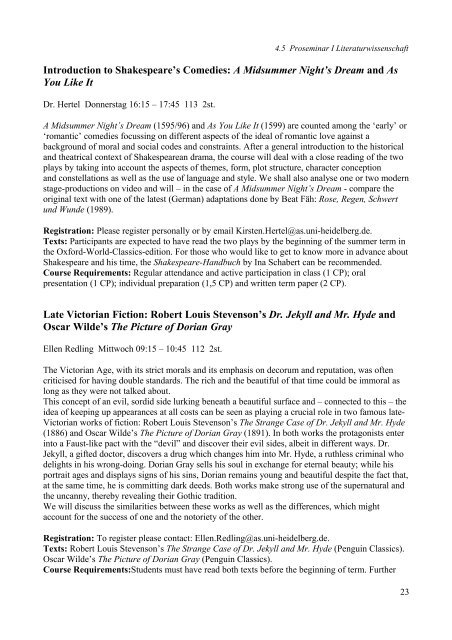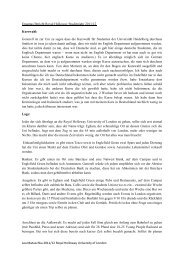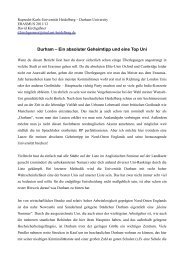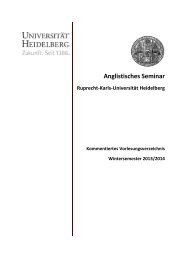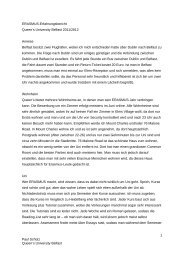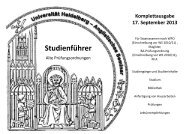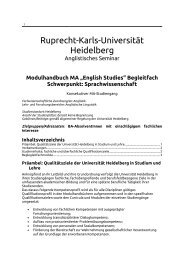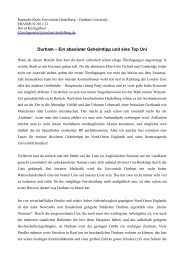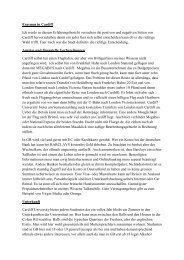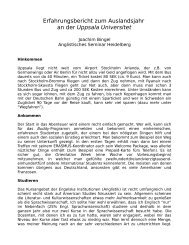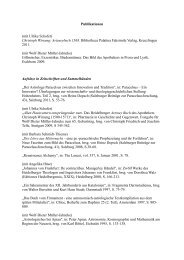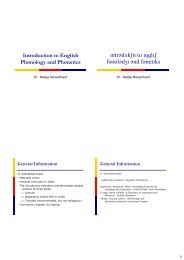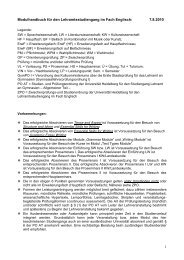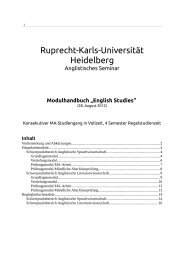Kommentiertes Vorlesungsverzeichnis Anglistik Heidelberg SS 2008
Kommentiertes Vorlesungsverzeichnis Anglistik Heidelberg SS 2008
Kommentiertes Vorlesungsverzeichnis Anglistik Heidelberg SS 2008
Create successful ePaper yourself
Turn your PDF publications into a flip-book with our unique Google optimized e-Paper software.
4.5 Proseminar I Literaturwissenschaft<br />
Introduction to Shakespeare’s Comedies: A Midsummer Night’s Dream and As<br />
You Like It<br />
Dr. Hertel Donnerstag 16:15 – 17:45 113 2st.<br />
A Midsummer Night’s Dream (1595/96) and As You Like It (1599) are counted among the ‘early’ or<br />
‘romantic’ comedies focussing on different aspects of the ideal of romantic love against a<br />
background of moral and social codes and constraints. After a general introduction to the historical<br />
and theatrical context of Shakespearean drama, the course will deal with a close reading of the two<br />
plays by taking into account the aspects of themes, form, plot structure, character conception<br />
and constellations as well as the use of language and style. We shall also analyse one or two modern<br />
stage-productions on video and will – in the case of A Midsummer Night’s Dream - compare the<br />
original text with one of the latest (German) adaptations done by Beat Fäh: Rose, Regen, Schwert<br />
und Wunde (1989).<br />
Registration: Please register personally or by email Kirsten.Hertel@as.uni-heidelberg.de.<br />
Texts: Participants are expected to have read the two plays by the beginning of the summer term in<br />
the Oxford-World-Classics-edition. For those who would like to get to know more in advance about<br />
Shakespeare and his time, the Shakespeare-Handbuch by Ina Schabert can be recommended.<br />
Course Requirements: Regular attendance and active participation in class (1 CP); oral<br />
presentation (1 CP); individual preparation (1,5 CP) and written term paper (2 CP).<br />
Late Victorian Fiction: Robert Louis Stevenson’s Dr. Jekyll and Mr. Hyde and<br />
Oscar Wilde’s The Picture of Dorian Gray<br />
Ellen Redling Mittwoch 09:15 – 10:45 112 2st.<br />
The Victorian Age, with its strict morals and its emphasis on decorum and reputation, was often<br />
criticised for having double standards. The rich and the beautiful of that time could be immoral as<br />
long as they were not talked about.<br />
This concept of an evil, sordid side lurking beneath a beautiful surface and – connected to this – the<br />
idea of keeping up appearances at all costs can be seen as playing a crucial role in two famous late-<br />
Victorian works of fiction: Robert Louis Stevenson’s The Strange Case of Dr. Jekyll and Mr. Hyde<br />
(1886) and Oscar Wilde’s The Picture of Dorian Gray (1891). In both works the protagonists enter<br />
into a Faust-like pact with the “devil” and discover their evil sides, albeit in different ways. Dr.<br />
Jekyll, a gifted doctor, discovers a drug which changes him into Mr. Hyde, a ruthless criminal who<br />
delights in his wrong-doing. Dorian Gray sells his soul in exchange for eternal beauty; while his<br />
portrait ages and displays signs of his sins, Dorian remains young and beautiful despite the fact that,<br />
at the same time, he is committing dark deeds. Both works make strong use of the supernatural and<br />
the uncanny, thereby revealing their Gothic tradition.<br />
We will discuss the similarities between these works as well as the differences, which might<br />
account for the success of one and the notoriety of the other.<br />
Registration: To register please contact: Ellen.Redling@as.uni-heidelberg.de.<br />
Texts: Robert Louis Stevenson’s The Strange Case of Dr. Jekyll and Mr. Hyde (Penguin Classics).<br />
Oscar Wilde’s The Picture of Dorian Gray (Penguin Classics).<br />
Course Requirements:Students must have read both texts before the beginning of term. Further<br />
23


